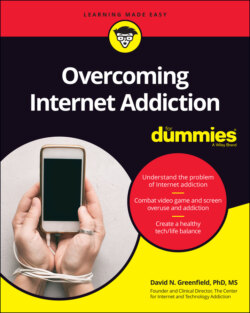Читать книгу Overcoming Internet Addiction For Dummies - David N. Greenfield - Страница 42
Being wired to maximize pleasure and minimize pain
ОглавлениеThe problem here is that in a sense, our brains act as if our addictive behavior is enhancing our health and well-being. However, this couldn’t be further from the truth. Perhaps this is partly why most addicts take a long time to reach a point where they see how the harm overrides the pleasure they are receiving. Some might call this process denial, where our brain is on autopilot, engaging in a dopaminergic behavior that tricks it into acting on a pattern that maybe hurting us. This is the essence of the addiction paradox: The brain is doing what it knows best, but at the same time, it is creating a significant life problem. This is in part why recovering from an addiction is so hard — why would you want to stop something that feels so pleasurable?
The other factor here is that as you increase activity in the nucleus accumbens, you are simultaneously inhibiting activity in the prefrontal cortex, where reasoning and executive functions are located; the brain is all about pleasure and has less ability (or desire) to apply the brakes once it’s in the pleasure cycle.
All organisms are wired to maximize pleasure and minimize pain. This makes sense on many levels, especially when you understand that pleasure equals survival in terms of our brain’s evolutionary biology (as I explain earlier in this chapter). Of course, it is understood that we as humans are not simply driven by pleasure; we have many other drives and desires that can transcend our more basic biological nature, but sometimes, some of us get stuck on the pleasure merry-go-round.
The reward center of the brain is largely selective to the neurotransmitter dopamine, which is an excitatory brain chemical, while the frontal lobes are more inhibitory and are designed to counteract some of these excitatory effects (the main frontal lobe brain chemical is GABA, or gamma-aminobutyric acid). You ideally need both brain chemicals, but addiction can skew your nervous system in the pleasure direction of this delicate balance and tip the scales in favor of dopamine and pleasure, while ignoring the rationality and reason of your frontal lobes. This imbalance is more likely to occur during adolescence and young adulthood due to the brain being immature. The balance between pleasure and self-control is necessary for mature development, but too much of a good thing (dopamine pleasure) can increase the likelihood of an addiction and produce a negative impact on real-time living. Flip to Chapter 4 for more details.
Addiction is not simply the physical dependence on an intoxicating drug or behavior. Rather, addiction involves changes in motivation, learning, mood, life balance, social relationships, negative health impacts, and decreased work or school productivity. With specific regard to Internet addiction, there can be an all-encompassing preoccupation with screens and the content consumed online.
